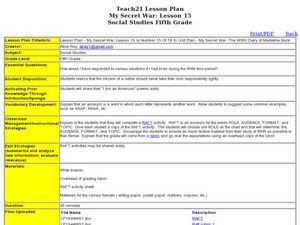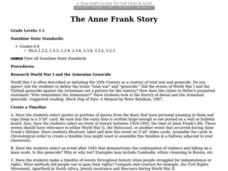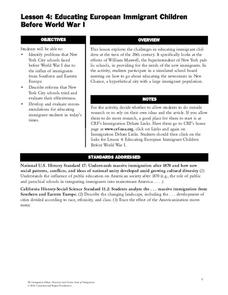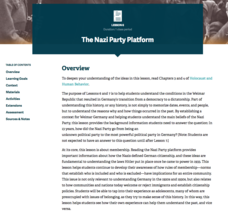Curated OER
My Secret War: Lesson 14
Fifth graders explore the civilian role during World War II. In this social studies lesson, 5th graders write an "I Am an American" poem from the perspective of various Americans during the war.
Curated OER
My Secret War: Lesson 13
Fifth graders explore the effect of World War II on the lives of children in America. In this social studies lesson plan, 5th graders read My Secret War and discuss the events that occurred.
Curated OER
My Secret War: Lesson 15
Fifth graders discuss civic responsibility. In this social studies lesson, student read about World War II. Students compose "I Am an American" poems and share with the class.
University of California
Decolonization
The ripple effect from one small event can impact many others. Young historians research the ripple effect World War II had on decolonization in the second installment of an eight-part series. Through primary and secondary documents as...
PBS
WWII: Detained
Imagine being forced against your will behind barbed wire for doing nothing but being yourself. Scholars investigate the impact Japanese-American internment camps had during World War II. Through video and archival evidence, they create...
Facing History and Ourselves
How Should We Remember?
We must remember the past in order to avoid its mistakes. Young historians analyze the importance of historical remembrance using primary and secondary documents, as well as video clips. They then study the creation of a World War...
Curated OER
Attu: North American Battleground of World War II
Students examine military maps and photos to better explain why an isolated battle on a remote island in Alaska alarmed the nation. They explain how the Japanese occupation and American recapture of Attu were significant in the history...
Curated OER
My Secret War: The WWII Diary of Madeline Beck: Lesson 6
Fifth graders explore women's rights by discussing the events of WWII. In this American work force lesson, 5th graders identify the events that led to World War II and how women helped fight the war through non-violent efforts. Students...
Curated OER
The Anne Frank Story
What is genocide? Create timelines regarding the human genocide. Middle and high schoolers analyze information that requires them to consider links between Armenian genocide and the Holocaust. In groups, theydesign timelines that...
Constitutional Rights Foundation
Educating European Immigrant Children Before World War I
As if surviving a journey to America wasn't enough of a feat for early 20th century immigrants, they then needed to settle into American life. Learn about the ways New York public education attempted to meet the needs of its students,...
Curated OER
Continuity or Change? African Americans in World War II
Students examine the experience of African Americans during World War II by analyzing primary sources and formulating historical questions. They evaluate if the African American experience during World War II represents continuity or...
Curated OER
World War II Notes
In this World War II study guide worksheet, students read the notes provided regarding U.S. involvement in the war and add notes of their own.
Curated OER
Events of World War II
Ninth graders examine the main leaders and events of World War II. In small groups they analyze images of main events in WWII, listen to a lecture, and complete a fill-in-the-blank worksheet.
Curated OER
Evaluate Causes of U.S. Involvement in World War II
Students examine and evaluate causes of U.S. involvement in World War II by interpreting a telegram from General Douglas MacArthur to William Allen White, the publisher and editor of Kansas' Emporia Gazette.
Curated OER
World War II: The Home Front
Students take a field trip to the MacArthur Memorial to learn what life was like in Norfolk during World War II.
National Endowment for the Humanities
How "Grand" and "Allied" Was the Grand Alliance?
Learn more about the Grand Alliance with a scaffolded lesson plan that includes four activities. Class members use primary sources to complete a map exercise, understand the goals and objectives of each individual nation, and participate...
Facing History and Ourselves
Identity and Place
Build scholars' ability to understand their own values and learn about World War II at the same time. Scholars write poetry and discuss identity and place in depth with an in-depth social studies resource.
National WWII Museum
What It Takes to Win: Mapping Primary Source Evidence
World War II was not just waged in Europe and Asia; the home front was key to Allied victory. Using newspaper clippings from World War II and a map, scholars plot out wartime production in the United States. After that, class members...
Maryland Department of Education
The Concept of Identity Lesson 8: Propaganda in Visual Media
Visual and print propaganda are featured in a lesson that asks readers of A Separate Peace to examine the techniques used in propaganda from World War I, World War II, presidential elections, and in the novel.
US Holocaust Museum
Remember the Children: Daniel’s Story
Imagine being a child forced from your home and into a concentration camp during World War II. Scholars prepare for a visit to the United States Holocaust Museum by researching the children of the horrible event. They analyze...
Facing History and Ourselves
Kristallnacht: Decision-Making in Times of Injustice
Have you ever been singled out in a crowd before? Pupils investigate and analyze the events of the Holocaust. They dive into the life of a middle school student, as well as the diary entries of those in Kristallnacht during World War...
Facing History and Ourselves
The Nazi Party Platform
Not all party platforms stay democratic. A resource covers many political issues in Germany during the time of World War II, and teaches pupils about the Nazi party platform and what went wrong. Individuals participate in a warm-up...
Facing History and Ourselves
Do You Take the Oath?
Why did so many go along with Nazi policies during World War II? An investigatory unit includes four handouts, reading analyses, classroom discussion topics, and intriguing philosophical questions, helping learners understand the...
Facing History and Ourselves
Laws and the National Community
When it comes to the law, is justice always served? Teach scholars about how law sometimes enables prejudice of entire groups of people with a unit on World War II that includes a warm-up activity, analysis of primary sources,...
Other popular searches
- Causes World War Ii
- World War Ii Map
- World War Ii Holocaust
- World War Ii Battles
- Post World War Ii
- Propaganda World War Ii
- Causes of World War Ii
- World War Ii Newspaper
- World War Ii Veterans
- Allies in World War Ii
- World War Ii Geography
- Post World War Ii Asia























